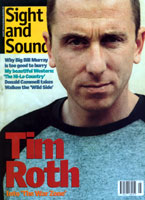Primary navigation

Algeria/France/Germany/Switzerland 1997
Reviewed by John Mount
Our synopses give away the plot in full, including surprise twists.
A palm plantation in a Saharan oasis. An innocent tryst between Amin and Myriam is interrupted by her brothers who beat Amin senseless, claiming Myriam has dishonoured her family. Amin's brother raises the alarm and soon the two clans are ready for violence.
Myriam takes refuge in a temple. A meeting of the town elders is called to quell the violence. Meanwhile, roadblocks are put up and the town is sectioned off into no-go zones. Myriam returns to her family to await her uncle's return (her father is dead) and Amin is sent into exile to live with Houria du Ksar and Sage Omar in an abandoned citadel.
Tempted by his cousin, Amin is chided by Houria for his weak heart. He visits Myriam who has been examined, found intact and chained up at her family house. Myriam escapes with the help of her mother and finds comfort with Houria. Myriam's uncle returns furious and hastily arranges her marriage. Myriam reluctantly returns but panics during her wedding feast and kills her bridegroom. She returns to Amin and mass violence breaks out in the oasis. The next morning, the lovers discover hardly anyone is left alive. Houria leaves Sage Omar on his landlocked boat. He beseeches a young boy to join him before the flood but the child rejects his offer and moves on.
Mohamed Chouikh is an established Algerian director with a solid critical reputation. He's fond of using a certain level of abstraction in his films in order to criticise antiquated and repressive religious doctrines and tribal customs. The Citadel/El Kalaa, for example, balked at restrictive, polygamous Muslim laws. The parable that is L'Arche du désert is designed to challenge the brutality and destruction caused by ethnic separatism, particularly in the wake of the disintegration of the old order. Unfortunately this is a more complex subject than his fables can contain.
L'Arche du désert relocates Romeo and Juliet's story to a precious Saharan oasis. The fragile social fabric is shredded by the illicit love affair and the reawakened tribal hatred it stirs. As if that weren't enough, an allegorical version of Noah's Ark (representing the bible and moral standards stuck in tradition) raises its prow out of a sand dune as a clueless wiseman warns a child (representing hope) about the forthcoming flood. The child scarpers over the horizon in search of a land where the grown ups aren't crazy and where children aren't killed (presumably only to stumble into the next war zone). The moral of Chouikh's tale - that in an inhospitable climate, life can only flourish with tolerance - all but flounders under the weight of so much bible and Bard.
Admirable though the director's sentiments may be, a lack of specificity neutralises his impassioned political plea and leaves it mired in universalised rhetoric. Technically, the film is more than competent, featuring some strong naturalistic performances while the direction of large-scale set pieces is impressive. Yet despite the fact that L'Arche du désert depicts a town on the edge of clan-driven bloodshed, for all its melodrama it remains curiously uninvolving, perhaps because the story remains far too schematic. Certain class divisions between the warring clans are fleetingly alluded to and the ingrained beliefs of the village elders are carefully examined but the narrative remains too oblique to fully engage emotionally or intellectually.
Having set up his dramatic, politically sensitive scenario, Chouikh offers no solutions to the problems he raises (aside from romantic love and belief in the children). Rather than examining more fully the political structures in which they live, Chouikh throws it all back onto the villagers. It's not as if films with universalised themes and powerful political messages cannot be made - a good example would be the Indian director Mrinal Sen's Génésis which offers a parable about sexual politics and the impossibility of achieving Utopian harmony. Nor can one underestimate the impact of the oblique but politically acute strategies by which Chinese and Soviet film-makers started to address Communism in the 80s and 90s.
Perhaps Chouikh would have done better to have either been more decisively abstract, stripping down the narrative, or more explicit within his naturalistic setting. Although a domestic audience might recognise allusions to Algeria's current crises, the work seems unlikely to have any significant effect on the very real problems of ethnic separatism either locally or internationally.